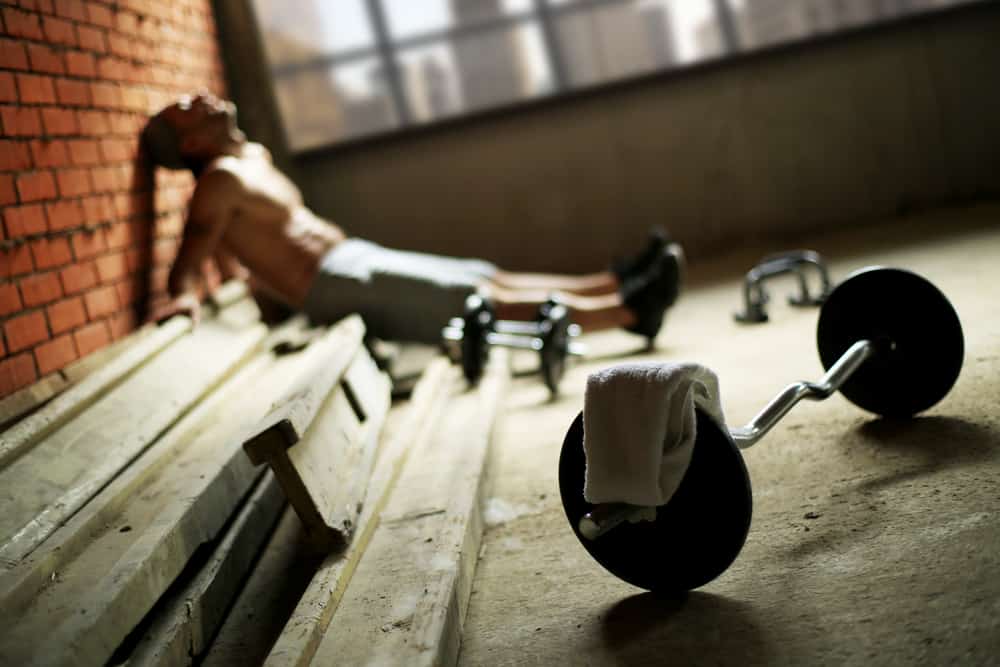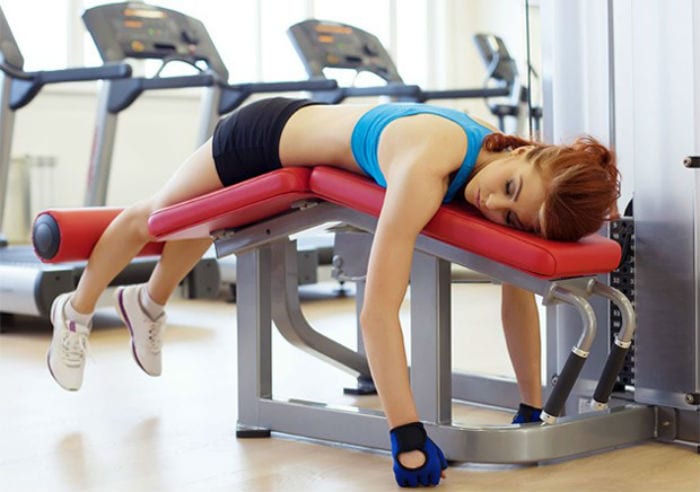You work hard – week after week, month after month, you eat properly, you have enough rest, but … there is no growth. Results that you expect are missing, something worse – you lose strength and during training you feel tired, nothing is as before. So you have a big problem:
OVERTRAINING

It is a problem for everyone – from beginners to advanced. It is most often caused by a lack of time to recover between workouts or excessively heavy workouts in the gym. The importance of rest is often difficult to understand, especially for novices or over-motivated bodybuilders, who, when it comes to exercise, believe that “more” simply means “better.”
In sports physiology, the term “overcompensation” means a process of recovery. When you exercise, you damage muscle fibers. After training, the body synthesizes new ones to erase the damage. But muscles are not only “repaired” but also strengthened with extra muscle tissue – a phenomenon known as super – or overcompensation – and it is precisely this that causes new muscle growth. However, this reinforcement is only during the recovery period. So there will be progress if you rest as efficiently as you train.
When you constantly violate the principles of recovery, creating an imbalance between training and rest, overtraining occurs. The most common sign is fatigue, but also mood swings and depression, depression, etc.
|
10 most common signs of overtraining:
|
|||||
|

Glucose regulation changes and sometimes you may experience a bout of hypoglycaemia during exercise. The quality of training decreases – you do not train so efficiently, in some testosterone decreases, but cortisol, the body’s stress hormone, increases. Therefore, doctors define overtraining as a neuroendocrine disorder.
Training, especially with weights, is a catabolic process that causes muscle tissue to break down. The body responds by rebuilding stronger muscle tissue and much of this process takes place during sleep. If you don’t get enough sleep, you don’t give your body time to rebuild. The average person needs about 7.5 hours of sleep, but for some this time can vary from 5-6 to 9 hours.
Apart from the lack of rest, overtraining can also occur when the intensity of training and weights increase at the same time. Therefore, if you decide to increase the training days from 3 to 4 or 5, do not increase the weights. Choose – either frequency or intensity. Ideally, for a series you should do between 8 and 12 repetitions. Once you start doing 12 without feeling tired, increase your weight by 10% – but no more.
Here, the eighth repetition should already be difficult to perform and you may do 8 or 9. Nothing – work until the accumulated force allows 12 repetitions of higher weight, then repeat the cycle again. And the harder you train, the more time you need to rest and recover. Once you increase the weight, it should be at least 48 hours before you train these muscle groups again.
The longer the overtraining, the longer you need to rest. It follows that early detection of overtraining is very important – if it has occurred for a short period (3-4 weeks), 3 to 5 days of rest is usually sufficient. Then continue with the old intensity, but the overall level (number of series) to be less. In severe cases, training should be interrupted for 2-3 weeks, and the recovery period could take months. Therefore, it is recommended that the workouts be in cycles, which always have mandatory recovery phases.
But the appearance of overtraining can be caused not only by training, but also by other factors such as previous illnesses, monotonous training, frequent competitions, physiological stress, many trips and more. Climatic differences also have an impact. When it’s hot outside, you don’t have to work too hard to lift your heart rate. To avoid overload due to heat, monitor your heart rate during exercise and adjust your pace accordingly.

A factor with an extremely large influence on overtraining is the rich and proper diet – every 2-3 hours, a total of 5-6 meals a day. It is also important how much protein, carbohydrates and fats you eat. Eating a low-carb, high-protein diet is not good for an active lifestyle.
There is no more negative impact on training than dehydration. Sufficient water is very important – you sweat with it, maintain a constant body temperature, pump blood into the working muscle and expel toxins. Under normal climatic conditions and for activities under 90 minutes, drinking at least 2 liters of water is preferable to fruit juices or sports drinks. Ideally, you should drink a glass of water 30 minutes before a workout, 3 to 6 glasses every 15 minutes while training, and another glass 30 minutes after.
If the workout is in a warm and humid environment, the risk of dehydration is especially high – the body can lose up to 1-2 liters of water per hour through sweat. So provide another liter of water. And remember that thirst is not a sign of the beginning of dehydration – when you feel it, you are already dehydrated. But we must look for a solution to the problem of overtraining, it hides only one word – rest
Do you want us to prepare for you a personal training program and / or diet, to monitor your development and together to achieve the desired results?
Learn more about the services
Most people have lagging muscle groups that need more attention in order to build a beautiful and symmetrical body, so you need a specially designed training program, which is:
- Created for your goals and capabilities
- According to your training level
- Tailored to your lifestyle
- Tailored to diseases if you have any
- Communication and monitoring of results within 30 days
You should know that there is no universal way of training that can give equally good results for different people. Everyone has different genetic predispositions that determine the development of his body. Therefore, you need an individual training program tailored to your lifestyle, your goals, your training experience and the free time you have. We can prepare a training program especially for you. For more information, write us a personal message in the contact form, e-mail [email protected] or click on the photo.
What will you get?
- Description of the training program – what and how to train. Technique of performing each exercise.
- Link to each exercise, how it is performed, how many sets and repetitions.
- Rest time between sets and individual exercises.
- Emphasis on certain muscle groups if necessary.
- Different training methods.
- Communication and monitoring of results within 30 days


